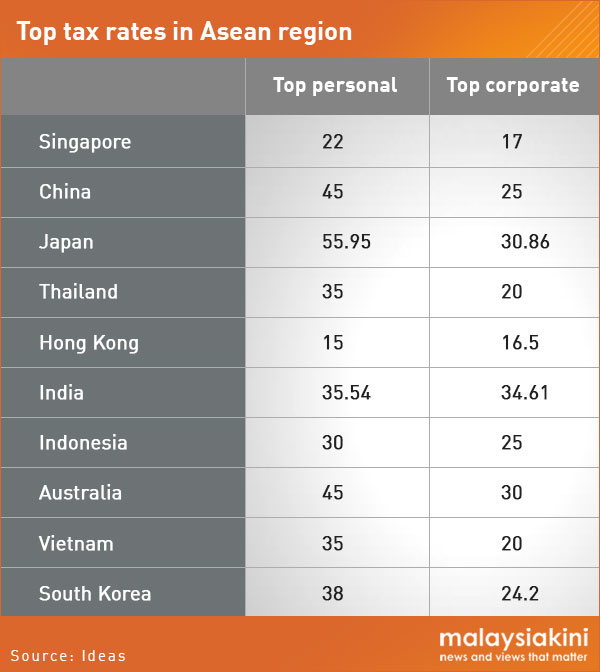
Lowering taxes to generate more government revenue may sound counter-intuitive, but according to renowned economist Dan Mitchell, this has been done elsewhere before and can be emulated by Malaysia.
Writing for Institute for Democracy and Economic Affairs' (Ideas) latest policy paper, Mitchell said Malaysia's present tax regime was "neither great nor terrible" and in fact imposes lower taxes than most regional neighbours.
At present, Malaysian businesses pay 24 percent in taxes at most while the highest amount of tax levied on individuals is 28 percent. Furthermore, consumers also pay six percent in goods and services tax.
Mitchell said while developing nations tend to spend more than what they can collect in taxes, these countries must also take cognizance of the established correlation between lower taxes and economic activity.
This is illustrated by the Laffer Curve, which describes optimal tax rates to maximise revenue and that if taxes were set any higher, it would eventually reduce tax collections.
However, the goal, Mitchell cautioned, was not "revenue-maximising" but setting "growth-maximising" tax rates.
He then cited the example of the 1980s United States, which saw a dramatic increase in tax collections after the top personal tax rate was reduced from 70 percent to 28 percent under the Reagan administration.
"Critics argued that this policy was unfair. They said rich people would not pay enough tax and they said the Treasury would be deprived of large amounts of tax revenue. So what actually happened?
"If one examines the 1988 data... revenues actually increased dramatically, rising from $19 billion to more than $99 billion.
"This happened because there was a big increase in the number of rich people and an even bigger increase in taxable income," he said.
Optimal tax rate for Malaysia
So, what then would be the ideal tax rate for Malaysia? According to Mitchell, the answer is "zero".
By abolishing personal or corporate income tax, which Mitchell described as a form of "big bang" reform strategy, Malaysia would become a fiscal paradise that will draw investors and entrepreneurs and become a dominant regional economy.
"Changes of this magnitude presumably would require increases in other sources of revenue, such as an increase in GST.
"If there are concerns about collecting enough revenue from upper-income taxpayers, it also would be possible to have selective luxury taxes on real estate and personal property, such as high-value automobiles," he said.
Should policy makers prefer more modest reforms, Mitchell said, then lowering personal and corporate tax rates to 15 percent would be a "very astute" strategy.
This would boost Malaysia's competitiveness in the region, attracting jobs and investments.
"A big advantage of modest tax rates is that compliance is stronger when the tax system does not impose heavy burdens on entrepreneurs, investors and business owners.
"Regardless of whether Malaysia goes with a 'big bang' reform or incremental reform, pro-growth changes will not be durable and sustainable unless they are accompanied by meaningful restraint in spending," he said.
Mitchell is a senior fellow at the Cato Institute, a non-partisan think tank dedicated to the principles of individual liberty, limited government, free markets and peace.

-Mkini



No comments:
Post a Comment
Note: Only a member of this blog may post a comment.